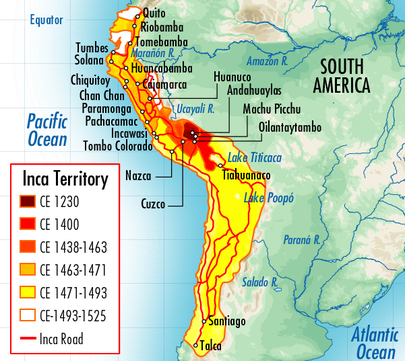 |
| http://incaastewart.weebly.com/uploads/1/5/2/7/15278426/5285037.jpg?405 |
The Spanish conquistadors, led by Francisco Pizarro, arrived in Ecuador to find the Incan empire in the midst of a violent civil war fought over the Incan throne. With superior weaponry and tactics, the Spanish overpowered the Incan armies and captured the Incan Emperor. With a crippled Incan government, the Spanish succeeded in conquering the rest of the Incan Empire. A year later, Spanish conquistadors, Sebastián de Belalcázar and Diego de Almagro, created the city of San Fransisco de Quito naming it in honor of the conquering conquistador Francisco Pizarro. This city became an important part of the Spanish Colonies in the New World, serving as a center for trade. The spanish used a system called "Encomienda" to govern these conquered lands. The "Encomienda" system was where the Spanish would protect the Native groups inside in exchange for tribute. This tribute usually came in the form of precious metals and food. This system was heavily abused however. The encomiendas (leaders of encomienda ruled areas) often forced the Natives to give unreasonable amounts of tribute for their continued protection. Often times, this would lead to basically slavery in the areas as these natives became indebted to their "encomendero" and were forced to work for food and other resources to try to recover from the increasing debt put on their shoulders. In order to combat abuse, the encomenderos were never supposed to set foot on native land and the natives were to bring the tribute to the encomienda. This however, led to even more hard times for the natives as they had to carry huge amounts of food and resources large distances to get them to their encomendero. While the natives were delivering food, they couldn't be working which set them farther and farther behind and led them spiraling into debt. Instead of helping the problem, the Spanish made the problem much worse by forcing the natives to transport the resources. Finally, King Charles of Spain in 1542 passed new set of laws called "The New Laws". These were meant to finally end the "Encomienda" system by giving all natives full Spanish citizenship. This also meant that these natives could not be forced to work if they didn't want to which ended the pseudo-slavery that they were experiencing. However, this angered the encomenderos, which led to a violent uprising which prompted King Charles to repeal most of the New Laws. Eventually the Encomienda system would fall out of fashion, the native people assimilated, and trading economy would be set up. This would be the end of the Colonial age.
How do you think the Encomienda system influenced Quito's culture. How do you think the Incans wiped out so easily?
The Incans were easily wiped out because they were caught in a bad situation when the Spanish arrived. Having to focus on their own civil war was a distraction to fighting off the Spanish. They were likely to lose even if they weren't in a civil war because they did not have the same technology and weapons as the Spanish. The Encomienda system may have influenced Quito's culture and economy after the system was repealed. The tribute goods they were manufacturing for the Encomienda system could be applied to their trading system and strengthening their economy.
ReplyDeleteThis comment has been removed by the author.
ReplyDelete